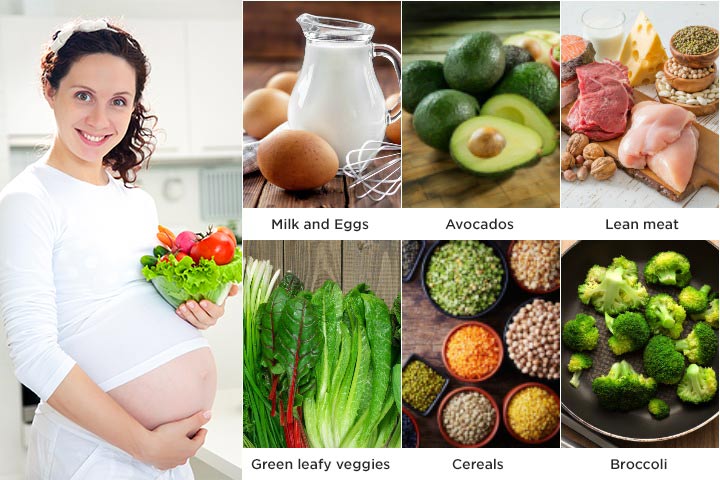Things to know before getting pregnant

Are you planning to have a baby and do not know what to prepare? Learn the pre-pregnancy essentials that will help you get through your pregnancy in a healthy way. Here are the do's and don'ts when preparing for pregnancy.
Things to do before getting pregnant
Pregnancy and childbirth is a woman's natural ability. But to have a healthy, happy pregnancy, mothers need to plan carefully. When you're ready to welcome your baby into the world, it's time to make some changes according to the guidelines below:
1. Life mode
Exercise to improve health
While this is advisable at any age and stage, not everyone has a regular exercise routine. If you have started planning to get pregnant, you need to exercise every day for about 30 minutes. You should also gradually refer to gentle exercises for pregnant women from now on, especially paying attention to avoiding movements that have the risk of falling or injury. Walking, cycling, swimming or participating in special exercise classes for pregnant women… all bring good results.
Exercising not only helps improve health, but according to doctors, a neat body also contributes to limiting many troubles when giving birth later.
Get enough sleep
Please readjust your sleep. If you often stay up late, get up early, don't get enough sleep, it will affect ovulation and make it more difficult to get pregnant. Moreover, lack of sleep will make your health, mental fatigue, fatigue, which will be even worse when you have morning sickness.
You need to sleep 7-8 hours a day, and should start going to bed at 10: 10:30 pm, quietly do not do anything, not even talk, deep sleep will fall around 11 pm is the most reasonable. . Increase the quality of sleep by creating a quiet, clean bedroom space with the right temperature and light.
2. Reasonable diet

Preparing for pregnancy, mothers need to change their daily menu from fast, greasy foods to fresh, healthy foods. Mothers need more protein, iron, calcium and folic acid each day. These nutrient-dense foods include fruits, peanuts (peanuts), green vegetables (especially leafy greens), whole grains, and low-fat products. At the same time, mothers should reduce low-calorie foods, chips, baked goods, soda... Not only mom, but dad also need to change according to this menu because the child is the result of both mother and father. Father.
3. Supplementing with micronutrients
A reasonable diet is also difficult to provide enough nutrients for the body when you are preparing for pregnancy. According to the recommendations of the International Federation of Obstetrics and Gynecology (FIGO) in 2015, the nutrients women need to pay special attention to before pregnancy are: Omega-3 fatty acids DHA/EPA, folic acid, iron, calcium, vitamin D and iodine.
You can consult your doctor about micronutrient supplementation before and during pregnancy.
Start antenatal care now to avoid any nutritional deficiencies in early pregnancy. It is especially important to supplement with folic acid to prevent neural tube defects in early pregnancy.
See more : What supplements should be taken before pregnancy?
4. Weight tracking
Many mothers do not pay attention to this problem, but the body is too thin, the amount of belly fat is not enough, which also reduces the ability to conceive. In contrast, when the mother is obese, it also increases the risk of diabetes (for both mother and child), increases blood pressure and always feels tired and heavier during pregnancy.
Try to achieve a healthy weight based on your body mass index (BMI). BMI will help you know which group you are in to adjust: overweight, obese or underweight. Talk to your doctor for advice on the correct weight.
5. Pre-pregnancy health check

Understanding the health problems they are facing can help mothers be more proactive during pregnancy and childbirth later on. Therefore, the mother needs to go to the hospital for advice on the following contents:
Vaccinations before pregnancy
Vaccinations can help protect both you and your child from some communicable diseases. Vaccines are currently recommended before pregnancy: Measles – Mumps – Rubella, Chickenpox, Hepatitis B and Influenza.
Besides, you should also be more aware of yourself about avoiding infectious diseases, strengthening your resistance to prepare the best health for the upcoming pregnancy.
Physical health check
Annual health check is a must. As you prepare for the exam, this is even more important. This will help detect health problems before they become serious. Your doctor will examine you and may order some blood tests to check things like cholesterol levels.
Detect and treat your health problems. At this visit, you can also bring up any other health concerns you may have. As the direction of treatment of health problems you are having.
Tell your doctor that you're trying to conceive so he or she can review your prescription, medication, or any other supplement you may be taking. There are certain medications that should not be taken during pregnancy and pregnancy. Changing medications or stopping treatment will be prescribed individually for you.
Obstetrics and Gynecology Examination
Depending on a number of factors (age, previous fertility problems, etc.), you may be able to schedule an appointment with an obstetrician to feel more secure about your pregnancy plans this time around. You can get screened for STIs, get screened to get pregnant. Or you can ask for pregnancy tips when you have had a history of miscarriage or stillbirth…
For couples who are pregnant for the first time, you can ask for more details about prenatal check-ups to feel more secure when you are equipped with a lot of useful knowledge, psychologically ready for life after marriage. Premarital health helps prevent the spread of sexually transmitted diseases. In addition, this examination also helps in early detection and timely treatment of hidden diseases in the body, preparing for good health to welcome the baby to be born.
Learn about family health history
In addition to your and your husband's health problems, you should also learn more about your and your husband's family health history. Your baby's health will also be affected by genetic factors that run in your family. Before becoming pregnant, you can ask your parents or other relatives if there are any genetic conditions in your blood. Find out before you talk to your doctor about any screening related tests in the future.
And after all of the above, staying healthy before getting pregnant can help improve your chances of getting pregnant. This can also help prevent pregnancy complications while you're pregnant. Good health before pregnancy includes getting. If you're trying to get pregnant, start focusing on your health at least 3 months before you start trying to get pregnant. If your medical condition could affect pregnancy, it may take longer for your body to be ready to have a baby.
6. Learn about conception
Increase your chances of getting pregnant by reading the basics of conception. You and your husband should also read the literature to understand how pregnancy happens. Learn about ovulation to increase your chances of conceiving.
You may be able to conceive within the first few trying cycles, but it may also take longer. The arrival of the baby was a surprise. Be prepared to welcome your baby.
7. Prepare financially
Pregnant and preparing for the birth of a baby, mothers need to "nourish" more, shop for their children from clothes, prams, milk, diapers... Make a list of things to shop for and save money to be proactive in everything.
Need a solid financial plan to prepare for your baby right now. By increasing income, as well as saving expenses from both husband and wife. In the opinion of medical professionals, when pregnant without complications, you can still do normal work in daily life until the day nearing the birth. Plan to cut unnecessary expenses.
Plan for expenses during pregnancy and childbirth: Medical expenses (pregnancy check-ups, vaccinations, births), food costs, supplies, and a host of unnamed expenses. Besides, you also need to prepare a contingency. You should consult with relatives, friends, people who have had children because they can advise you.
8. Find out information about obstetrics and gynecology hospitals
Before the information channels from relatives, friends, social networking sites ... you should find yourself reliable addresses to be able to periodically check antenatal care and register for the best birth service. Avoid letting everything close to worry that you won't make many mistakes and omissions.
Besides, you also need to find out about the insurance benefits that you are entitled to.
Things to avoid during pregnancy
Taking good care of the health of mother and baby plays an extremely important role. In order to help women have more experience to know how to take care and protect their health, here are the things to avoid doing before getting pregnant.
1. Avoid exposure to harmful chemicals
Exposure to high levels of toxins can be dangerous to a developing fetus. Try to reduce your exposure to harmful chemicals. Specifically:
• Tobacco, pesticides, house paints, cleaning paints... are all toxic chemicals that can cause birth defects in the unborn baby. Therefore, during the time you want to get pregnant, you should stay away from these chemicals. In addition, it also greatly affects the quality of sperm.
• Skip some chemical-related beauty services like hair dye.
• Choose chemical-free home and personal care products such as soap, dishwashing liquid, detergent, etc.
• X-ray radiation may not do much harm to you, but it can harm your unborn baby. Therefore, while still under the effects of radiation exposure, you should delay pregnancy to avoid leaving pitiful consequences for the fetus.
• Avoiding alcohol and smoking helps you get pregnant faster and improves sperm quality.
Here are some other things you can start doing today:
• Make your own household cleaner with water and vinegar
• Eat organic food
• Switch to fragrance-free laundry detergents
• Remove makeup products that contain parabens, sodium laureth sulfate, and mercury.
• Choose fresh foods instead of canned foods because plastic containers can contain BPA.
2. Stay away from threats of viral infections that can affect pregnancy
Two viruses that are warned to stay away from pregnant women are: toxoplasma and lymphocytic meningitis. They can be in undercooked meat, cat feces… You need to stay away from now to avoid the dangers they cause. Specifically:
• Make sure any meat you eat is fully cooked.
• Keep away from rodents such as mice, including pet rats.
• Stay away from cat poop. If you have cats, have someone take care of them and clean up the cat litter during this time.
3. Get pregnant right after premature birth or stillbirth, miscarriage
Your uterus in this case has suffered. You need at least 2 years to recover. If taking birth control pills to plan, when it's time to get pregnant, you should stop taking it 3 months before so that the uterus has time to secrete mucus to prepare for the implantation of a fertilized egg.
4. Arbitrary use of drugs
When you are pregnant, you must be very careful during the use of drugs, some drugs are really not good for the fetus, they even cause birth defects. It would be painful to give birth to an unhealthy baby just because of his ignorance. During this critical period, drugs should not be used arbitrarily, take a few minutes to consult with your doctor and experts in the field.
Follow these tips carefully to prepare for a healthy pregnancy ahead.